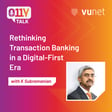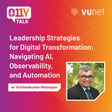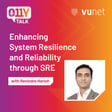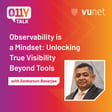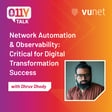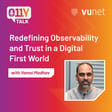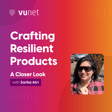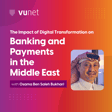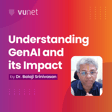Introduction and Episode Overview
00:00:11
Speaker
Welcome to a new episode of Observability Talk. If you have not seen our previous episode, I highly recommend that you listen to our conversation with Professor Balaji of IIT Madras on Generative AI and Observability.
Guest Introduction: Abhid Nirmuchuvana
00:00:26
Speaker
Today, we are glad to have Abhid Nirmuchuvana, co-founder and director of Dennis Pincher Capital.
00:00:35
Speaker
Abed is a visionary leader. As former CEO of Wipro, he oversaw an $8 billion business with more than 1.8 lakh employees. Abed wear multiple hats these days.
00:00:48
Speaker
He breaks his invaluable experience of a lifetime to advise and guide startups in their growth journeys.
Indian Startup Ecosystem Insights
00:00:56
Speaker
He also sits on the board of various companies, demonstrating his leadership in driving them towards innovation, growth, and stakeholder engagement. And beyond that, Abed loves traveling and reading. More importantly, Abed is very passionate about Indian startup ecosystem.
Q&A on Digital Transformation and Observability
00:01:14
Speaker
Good morning, Abed. Thank you for joining us today on this conversation. My first question to you is that you basically have been a board member, a leader in technology. We'd like to understand your perspective on digital transformation and customer experience. Specifically, how do you see observability playing a pivotal role in these areas?
Observability as a Strategic Element
00:01:40
Speaker
First of all, good morning and thank you Bharat for having me on this podcast. I'm very excited from a DVC perspective to partner with VUNet and you guys are an amazing team in an amazing area.
00:01:53
Speaker
You know, observability has always been very close to my heart in terms of ensuring a good customer experience while historically in the days of Tivoli and BMC petrol and many other observability tools 20 years back and I might be aging myself when I say that. It was seen as an infrastructure back-end activity. But with digital, like everything in technology, digital has brought
00:02:23
Speaker
it made it about the customer and the customer experience. And hence observability has also kind of taken that leap as to why it is important for customer experience. And I believe that a business process, you can look at observability from a business process perspective, from an application layer perspective and then infrastructure layer perspective.
00:02:47
Speaker
Across all of this, what observability allows you to do as a business is ensure that there has seamless experience for the customer and there is no downtime. Because even a small downtime, apart from the business impact that it has, it's irritating to the customer and it plays a very detrimental role. Downtimes play a very detrimental role in customer experience and that is why I believe now
00:03:11
Speaker
Even you talked about the board members perspective. I see this more as a strategic element to the business ensuring a good customer experience rather than a decision that you leave it just to the CIO to maintain back office processes of IT infrastructure and others like the olden days.
Boardroom Discussions on Observability
00:03:33
Speaker
In the digital world, to ensure a great customer experience, I think being able to observe your platforms and your platforms across the entire ecosystem for uptime is critical and very strategic to organisations.
00:03:49
Speaker
Thank you so much Abed and I think you are very clearly told that boards have started discussing observability in the boardroom and a couple of months back when we were having internally some discussions, we also felt that the board should start looking at a new role which is called Chief Observability Officer where observability is becoming so critical for the board as well.
GenAI and Observability Convergence
00:04:16
Speaker
Moving on, I would like you to
00:04:20
Speaker
Talk about how GenAI, because GenAI is becoming very, very critical and going forward, it is the way people are talking about GenAI being used in multiple use cases. How do you see GenAI transforming the landscape of enterprise technology systems? And do you see a convergence of technologies like observability, cybersecurity and business intelligence across different domains?
00:04:47
Speaker
A great question. I personally believe that as there is a proliferation of data from various sources across an enterprise, and I like to call, use the word extra price, what is inside the enterprise, but also what is with your partners and your ecosystem around you. It has become almost manually impossible to look at all of the events simultaneously.
00:05:15
Speaker
and make sense out of it. And that is why you need to use computational power to do that. And machine learning and gen AI provide the technology to be able to do event correlation across multiple inputs, multiple variants, all of that. So I think AI in general and machine learning and gen AI in particular.
00:05:38
Speaker
play a pivotal role. Almost they enable observability for today. Like they enable cyber security for today. Like they enable analytics for today. So there is a large amount of, a huge amount of convergence across all of this. Because what is the challenge in cyber security? Challenge is very similar, very analogous.
00:05:59
Speaker
to observability. You have your network, you have your cloud infrastructure, you have your applications and there are so many events happening in today. The world is about predicting. The world is not about analyzing.
00:06:17
Speaker
And that is where you need to know stuff and what strengths before an adverse event happens. Whether it is downtime from an observability perspective, or whether it is a cyber attack from a cybersecurity perspective, or whether it is a customer churn from analytics and intelligence perspective. And in all of these areas, Gen AI plays a big role because it's almost humanly impossible to be able to look at
00:06:44
Speaker
the data, not only of your own enterprise, but from all the APIs that your enterprise is connected with, all of the extra price, all of the partners, all of the flow that is happening. And that is why Gen AI is and will play a very, very critical role in observability and across all of the
Innovations in Indian B2B SaaS and VU Net
00:07:02
Speaker
aspects. And, you know, all of these things are very intertwined because enterprises can make the best value out of their investments if they
00:07:10
Speaker
connect what they hear and see in observability platforms for customer experience and business uptime, what they see in cybersecurity and trust and I call it trust. It is about data privacy, cybersecurity, all of those areas which keep customer trust because trust is the foundation for customer experience. And then analytics and intelligence that you do from a business perspective to do more cross-sell, more upsell, provide better service and personalized service to your customers.
00:07:41
Speaker
No, so very, very true a bit. Thank you so much for explaining that. One of the thing what we have been seeing in the market as well that people are asking for unification of tools for that matter. Like you said, everything will converse in single tool and they are looking at more unified way of looking at some of these data.
00:08:02
Speaker
Yeah, this is very interesting space to be in at this point of time. My question, the next question is more about your keen interest in the Indian startup ecosystem, right? Because Dallas venture capital is one of investors in unit, I would want you to give a quick view in terms of what really caught your attention about unit and what compelled you to invest in your
00:08:31
Speaker
So, you know, I'm personally very excited with the B2B SaaS ecosystem that is developing in India. I think like many things we've done in India, the B2B SaaS ecosystem has the ability to leapfrog the rest of the world. And we're seeing that in the payment space already with UPI and everything that India is doing on the India stack.
00:08:58
Speaker
I believe we haven't spent about 30 years in the Indian IT services industry, which is now a global force to reckon with. The next wave of growth in technology and the opportunity that India has is in the B2B SaaS space. But unlike the IT industry, which are 30, 40 years to develop, the B2B SaaS industry doesn't have that much time. What the IT services industry did in 30, 40 years
00:09:26
Speaker
perhaps you guys will have to do it in 10-12 years and that is where people like me and DVC will play a pivotal role because it is a little bit of paying forward. You know, learning from all the mistakes and experiences that we add, we can be helpful in not only by just investing capital but also providing the council and mentorship and advice and especially for the Indian
00:09:53
Speaker
B2B SaaS startup ecosystem. I believe that the success will depend on not only accessing the Indian markets, which is like you prove the product market fit, you prove the concept. And as I said, you know, sometimes there's a leapfrogging opportunity compared to the rest of the world.
00:10:09
Speaker
But after that, sell it into the developed markets, the US, the Western markets, and then all over the world including Africa, Asia, Middle East. And DVC's business model with what we call as DVC Advantage enables startups to go to market outside of India and provide the mentorship, the hiring, the ability, the customer connections, and the network to be successful over there.
00:10:36
Speaker
And from the day we saw Vyunet, Ashwin and yourself Bharat and others that we met, we fell in love with the company because I think even personally for me, you opened my eyes.
00:10:47
Speaker
with this very strong concept that VU net has, which is observability is important not only from an infrastructure and the vertical stack of a single organization perspective, which is how everybody has thought about observability. You've got this wonderful concept of the whole customer journey across enterprises. And I think that was the
00:11:12
Speaker
Killer idea, if I didn't say, because what is digital? Digital is all about customer journeys. And in payments, customer journeys are not limited to one organization. When you buy a product in retail, the customer journey starts from selecting a product.
00:11:32
Speaker
to paying for it and paying, there is a credit card operator or a payments operator, there is a payments clearing house, there is a merchant, there is a bank. And looking at the entire customer journey, across all of that is what VUNED does in the payment space. And I think that is the future of observability. Observability we get verticalized.
00:11:52
Speaker
across a customer journey, irrespective of how many organizational boundaries that journey has to undergo. Because finally, what are we talking about? We're talking about a great customer experience. We're not talking about an experience of a customer vis-a-vis one organization. And all of the current observability platforms, including big companies like Datadog or Splunk or others, are all focused on
00:12:21
Speaker
enterprises own vertical stack of observability and logging. Whereas we all came up with this wonderful concept of seeing observability from a customer's journey perspective across organizations. And you've very successfully implemented it in the India stack on UPI in the payment
Impact on IT Services and Startups
00:12:42
Speaker
space. And that is what attracted us apart from our enthusiasm for the B2B SaaS
00:12:48
Speaker
your entire concept and the product idea has been great and again you've got great customers and this is an area I think where India is leapfrogging compared to the rest of the world so having done it successfully in India I think even in US for example what we have as UPI in India
00:13:09
Speaker
Fred now will be the equivalent of the US and that is still in very nascent stage, very early stage and when I talk to a couple of financial industry experts, chief information officers in the US and when they have heard
00:13:25
Speaker
about the UPI and what VUnet is doing, they'll, their presence says, oh my gosh, I mean, this is ahead of even what is there in the US. When US is ready, we will adopt VUnet. This is a very big compliment for both the India stack and UPI and for what VUnet is doing. And that is what excited us. So it's always about the team.
00:13:46
Speaker
which is what we saw in all of you. It is about the technology. You are using deep technology to do it. And then there's about the traction that you are getting in the market. And we saw all the three Ts checkout, which is how EBC does its diligence and investments. And we are thankful that you gave us the opportunity to partner with you and invest in you and how closely Ashwin and all of you work with us to make V-Unit success. So very excited about it.
00:14:17
Speaker
Thank you so much Abit for the kind words. We are really happy to have you with us in this journey of making a world-class software product company out of India and we will do everything possible to realize your vision of making this happen in next couple of years. So if you look at that
00:14:40
Speaker
observability platforms basically being used by these large enterprises and IT services companies or MSPs basically have a large role to play because they basically provide these services to these enterprises.
00:14:58
Speaker
As your tenure of CEO of Wipro and your extensive involvement in managing these service providers, how do you perceive the role of observability, especially business journey observability or customer journey observability, which you talked about, in shaping the next growth for these IT services companies?
00:15:19
Speaker
I think without going into specifics of any particular company, just having seen this landscape and lived across this for over three decades and interacted with Fortune 500 companies, Global 2000 companies to whom the Indian IT services and companies like Wipro, TCS and others provide services. I think leading in with a toolkit like VUNet
00:15:46
Speaker
is very important for their own future. And that is because the whole services landscape is changing in two or three very fundamental ways. Number one, customers want digital service providers. They don't want their legacy service providers where the Indian IT industry started. And as you pivot into digital, as we spoke earlier, it is all about ensuring great client experience.
00:16:14
Speaker
and observability becomes a toolkit. There is almost 50 to 60% of the business that the Indian IT industry does is in managing the platforms for production across infrastructure, across applications, across business processes.
00:16:30
Speaker
as a vertical stack and observing across all of these vertical stack a customer journey could be a great value proposition that the Indian IT industry can pivot itself to become a digital services provider. So that is a huge
00:16:47
Speaker
opportunity. The other opportunity is a domain, let me talk about payment space, but there are hundreds of, you know, a claim in a healthcare industry or in the insurance industry is a customer journey that goes across multiple enterprises. There are very, very such examples in every vertical. I can go vertical by vertical and say examples which are critical for a customer, but they don't happen in the four walls of one
00:17:15
Speaker
company. They happen because multiple companies come together and provide that final outcome to the customer. And guess what? The ID services companies have in their customer base all of these multiple players. So they are very well positioned to get these together and drive observability across their platforms focusing on the customer and consumer journey rather than the individual
00:17:44
Speaker
that they are providing services to and that can be a huge innovation in how they are addressing the market. So, I believe that companies like VUNet and start-ups coming out of India in general
00:18:00
Speaker
will play a very pivotal role in the evolution because as it has been said very famously that the software is going to eat the world and I know as the CEO of Indian IT companies every time they get asked the question will the software disrupt the services industry and I think if you don't adopt
00:18:22
Speaker
All the companies like Vunet as partners or even acquisitions by the Indian IT services companies, it will disrupt them. But my prediction is it will get an even bigger opportunity when the Indian IT industry takes much more of a stake.
00:18:41
Speaker
in the Indian SaaS startup ecosystem to software their services and provide the same experience at a much better productivity, at a much wider score and at a much better price point.
Future Partnerships and Investments
00:19:00
Speaker
customers. So I think, you know, the entire ecosystem of the startups, but especially companies like Reunet are a great asset for the Indian IT services companies to partner with and evolve themselves from where they are to where they need to be.
00:19:19
Speaker
In fact, in one of my conversation today itself, I was talking to a very large IT services company and they were quite interested in not only partnering with us, they were also looking at exactly true to what you said, how do we invest in you, so that we can actually create much more
00:19:40
Speaker
close association with ViewNet so that they can actually use ViewNet product in whatever services business they are basically running.
Closing Remarks and Call to Action
00:19:49
Speaker
These are very very good insights Abit. Thank you so much for your time. Really appreciate it and looking forward to make your vision a reality in couple of years from here. Thank you for joining us at Observability Talk.
00:20:05
Speaker
Please subscribe our podcast on your favorite podcast platform. And if you think someone would find this episode insightful, please share it with them. For more information about us, please visit our website www.buretsystems.com. Thank you.

